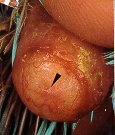
Many pet birds lay eggs in response to forming a sexual bond with their owners, perceiving their owners as their mate. Stroking and caressing the bird acts as a further trigger. Some birds bond with a toy or other inanimate object which then acts as a trigger for egg laying.
Chronic egg laying is a problem because it can lead to depletion of body calcium and egg binding. Bones become weak and folding fractures develop when too much calcium has been removed from them. Additionally, some hens become very aggressive during egg laying and don’t want to interact with their owners. They may attack and bite as they defend their nesting territory.
Egg laying may be discouraged by decreasing the fat content in the diet, by minimizing stroking and handling of the hen, by changing the enviroment and by certain hormones.
The environment may be modified by moving the bird to a less “secure” environment in the home. Any nesting areas should be removed.
The photoperiod my be manipulated by allowing only 8 – 10 hours of light per 24 hour period. The cage must be moved to a completely dark and quiet area. This may be very difficult for some owners if the only time they spend with their bird is in the evening. After several weeks, the period of light can be increased. Once the bird shows reproductive behavior again, the photoperiod is again decreased.
Certain hormones may be administered to turn off the female reproductive tract. Depo Provera was a hormone used over thirty years ago to stop egg laying. Although effective, side effects such as increased thirst, obesity and lethargy caused it to be abanded.
Human chorionic gonadotropin or HCG is a second hormone that has been used to stop egg laying. It causes the small ovarian follicles to shrink. Some birds seem to become refractory to it and some don’t respond at all.
The most widely used hormone at the present time is a Gn RH (gonadotropin releasing hormone) anolog known as Depo-Lupron or Leuprolide. Initial administration inhibits gonadotropin secretion. Subsequent injections lead to suppression of ovarian and testicular hormone production. Effects occur within 2 – 4 weeks of initiation of treatment. This suppression ovarian and testicular hormone production is reversible once Leupron is discontinued. Leupron is cosidered to be very effective and safe. The only drawback is that it is an expensive drug for the veteriarian to purchase.
Of course, a permanent solution to stop egg laying is surgery in which the oviduct and uterus are removed. This procedure is known as a Salpingohystreedtomy.

